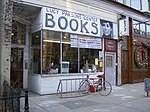Harriet Tubman Memorial (Boston)

The Harriet Tubman Memorial, also known as Step on Board, is located in Harriet Tubman Park in the South End neighborhood of Boston, Massachusetts. It honours the life of abolitionist Harriet Tubman. It was the first memorial erected in Boston to a woman on city-owned property.The memorial is a 10-foot tall bronze sculpture by artist Fern Cunningham and depicts Tubman leading a small group of people. She holds a Bible under her right arm. The figures are backed by a vertical slab, on the reverse of which is a diagram of the route Tubman took when accompanying passengers on the Underground Railroad, and several quotes by and about Tubman. The inscription on the back of the memorial reads: Locations along the Underground Railroad are shown along an arc: Canada, Rochester, Syracuse, Albany, New York City, Philadelphia, Delaware, and Maryland.
Excerpt from the Wikipedia article Harriet Tubman Memorial (Boston) (License: CC BY-SA 3.0, Authors, Images).Harriet Tubman Memorial (Boston)
Columbus Square, Boston South End
Geographical coordinates (GPS) Address Website External links Nearby Places Show on map
Geographical coordinates (GPS)
| Latitude | Longitude |
|---|---|
| N 42.34335 ° | E -71.07811 ° |
Address
Harriet Tubman Memorial (Step on Board)
Columbus Square
02199 Boston, South End
Massachusetts, United States
Open on Google Maps







